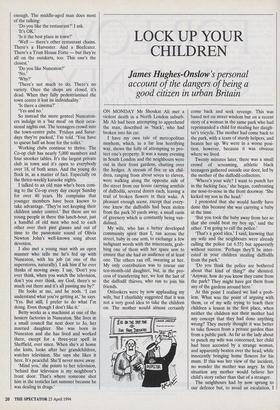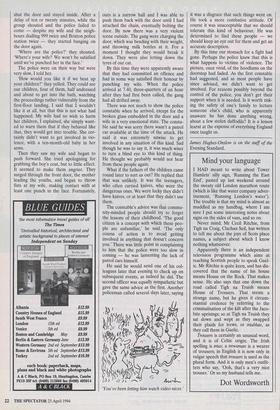LOCK UP YOUR CHILDREN
James Hughes-Onslow's personal account of the dangers of being a good citizen in urban Britain ON MONDAY Mr Shoukat Ali met a violent death in a North London suburb. Mr All had been attempting to apprehend the man, described as 'black', who had broken into his car.
I have my own tale of metropolitan mayhem, which, in a far less horrifying way, shows the folly of attempting to pro- tect one's property. It was a sunny evening in South London and the neighbours were out in their front gardens, chatting over the hedges. A stream of five or six chil- dren, ranging from about seven to eleven, were walking along the opposite side of the street from our house carrying armfuls of daffodils, several dozen each, leaving a trail of broken flowers in their wake. A pleasant enough scene, except that every- one knew the daffodils had been stolen from the park 50 yards away, a small oasis of greenery which is constantly being van- dalised.
My wife, who has a better developed community spirit than I, ran across the street, baby in one arm, to exchange a few indignant words with the miscreants, grab- bing one of them with her spare arm to ensure that she had an audience of at least one. The others ran off, swearing at her. My only contribution was to rescue our ten-month-old daughter, but, in the pro- cess of transferring her, we lost the last of the daffodil thieves, who ran to join his friends.
Onlookers were by now applauding my wife, but I churlishly suggested that it was not a very good idea to take the children on. The mother would almost certainly come back and seek revenge. This was based not on street wisdom but on a recent story of a woman in the same park who had reprimanded a child for stealing her daugh- ter's tricycle. The mother had come back to the park, with a team of sturdy helpers, and beaten her up. We were in a worse posi- tion, however, because it was obvious where we lived.
Twenty minutes later, there was a small crowd of screaming, athletic black teenagers gathered outside our door, led by the mother of the daffodil-collectors.
`Where's your wife? I want to punch her in the flicking face,' she began, confronting me nose-to-nose in the front doorway. 'She kicked my son in the head.'.
I protested that she would hardly have done this because she was carrying a baby at the time.
`But you took the baby away from her so that she could beat my boy up,' said the other. 'I'm going to call the police.'
`That's a good idea,' I said, knowing that my wife and the neighbours were already calling the police (at 6.55) but apparently without success. 'Perhaps they'll be inter- ested in your children stealing daffodils from the park.'
`Do you think the police are bothered about that kind of thing?' she shouted. `Anyway, how do you know they came from the park? They might have got them from any of the gardens around here.'
At this point I realised we had a prob- lem. What was the point of arguing with them, or of my wife trying to teach their children a lesson in the first place, when neither the children nor their mother had any concept that they had done anything wrong? They merely thought it was better to take flowers from a private garden than from a public park. As far as the lady about to punch my wife was concerned, her child had been accosted by a strange woman, and apparently beaten over the head, while innocently bringing home flowers for his mum. If this was her view of the incident, no wonder the mother was angry. In this situation any mother would believe her child's story rather than that of a stranger.
The neighbours had by now sprung to our defence but, to avoid an escalation, I shut the door and stayed inside. After a delay of ten or twenty minutes, while the group shouted and the police failed to come — despite my wife and the neigh- bours dialling 999 twice and Brixton police station twice — they started banging on the door again.
`Where are the police?' they shouted. `Where's your wife? We won't be satisfied until we've punched her in the face.'
The police were on their way but were very slow, I told her.
`How would you like it if we beat up your children?' they yelled. They could see our children, four of them, half undressed and about to get into the bath, watching the proceedings rather vulnerably from the first-floor landing. I said that I wouldn't like it at all, but that this is not what had happened. My wife had no wish to harm her children, I explained, she simply want- ed to warn them that if they behaved like that, they would get into trouble. She cer- tainly didn't want to get involved in vio- lence, with a ten-month-old baby in her arms.
Then they saw my wife and began to push forward. She tried apologising for grabbing the boy's coat, but to little effect. It seemed to make them angrier. They surged through the front door, the mother leading the youths, and began to throw fists at my wife, making contact with at least one punch in the face. Fortunately, ours is a narrow hall and I was able to push them back with the door until I had attached the chain, eventually bolting the door. By now there was a very violent scene outside. The gang were charging the door, which was bending with their weight, and throwing milk bottles at it. For a moment I thought they would break it down. They were also letting down the tyres of our car.
By this time they were apparently aware that they had committed an offence and had in some way satisfied their honour by punching my wife. When the police arrived at 7.40, three-quarters of an hour after they had first been called, the gang had all drifted away.
There was not much to show the police constable when he arrived, except for the broken glass embedded in the door and a wife in a very emotional state. The consta- ble said he was sorry there wasn't a patrol car available at the time of the attack. He said it was extremely unwise to get involved in any situation of this kind. Sad though he was to say it, it was much wiser to turn a blind eye to this kind of thing. He thought we probably would not hear from these people again.
What if the fathers of the children came round later to sort us out? He replied that that was unlikely. It was the teenagers, who often carried knives, who were the dangerous ones. We were lucky they didn't have knives, or at least that they didn't use them.
The constable's advice was that commu- nity-minded people should try to forget the lessons of their childhood. 'The good citizen is a concept with which these peo- ple are unfamiliar,' he said. 'The only course of action is to avoid getting involved in anything that doesn't concern you.' There was little point in complaining to him that the police were too slow in coming — he was lamenting the lack of patrol cars himself.
He said he would send one of his col- leagues later that evening to check up on subsequent events, as indeed he did. The second officer was equally sympathetic but gave the same advice as the first. Another policeman called several days later, saying `You've been letting him watch video nices.' it was a disgrace that such things went on. He took a more combative attitude. Of course it was unacceptable that we should tolerate this kind of behaviour. He was determined to find these people — we should keep an eye out for them and get an accurate description.
By this time our stomach for a fight had gone. Perhaps the police knew that this is what happens to victims of violence. The picture, once vivid, of the hoodlums on the doorstep had faded. As the first constable had suggested, and as most people have since advised, we didn't want to get involved. For reasons possibly beyond the control of the police, you don't get their support when it is needed. Is it worth risk- ing the safety of one's family to lecture someone else's child, who is apparently unaware he has done anything wrong, about a few stolen daffodils? It is a lesson learnt at the expense of everything England once taught us.
James Hughes-Onslow is on the staff of the Evening Standard.



























































 Previous page
Previous page